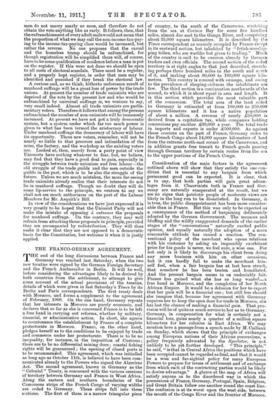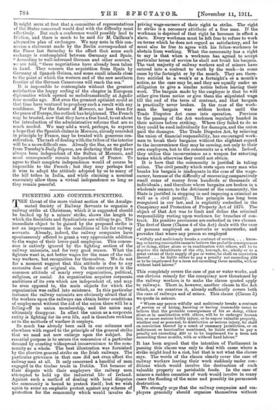THE FRANCO-G-ERMAN AGREEMENT. T HE end of the long discussions between
France and Germany was reached last Saturday, when the two new treaties were signed by the German Foreign Secretary and the French Ambassador in Berlin. It will be well, before considering the advantages likely to be derived by both countries from the settlement, to attempt to give some account of the actual provisions of the treaties, details of which were given in last Saturday's Times by its Berlin and Paris correspondents. The first treaty deals with Morocco, and forms a supplement to the agreement of February, 1909. On the one hand, Germany repeats that her interests in Morocco are purely economic, and declares that so far as she is concerned France is to be left a free hand in carrying out reforms, whether by military, financial, or administrative action. In short, she agrees to countenance the establishment by France of a complete protectorate in Morocco. France, on the other hand, pledges herself as to the conditions to be enjoyed by trade and commerce under her protectorate. There is to be no inequality, for instance, in the imposition of Customs ; there are to be no differential mining dues ; coastal fishing rights will be guaranteed ; the opening of closed ports is to be recommended. This agreement, which was initialled as long ago as October 11th, is believed to have been com- municated already to the Powers who signed the Algeciras Act. The second agreement, known in Germany as the " Colonial " Treaty, is concerned with the various cessions of territory between Germany and France in West Africa. Along the eastern and southern boundaries of the Cameroons strips of the French Congo of varying widths are ceded to Germany. These strips fall into three sections. The first of them is a narrow triangular piece of country, to the south of the Cameroons, stretching from the sea. at Corisco Bay for some five hundred miles, almost due east to the Ganga River, and comprising about 35,000 square kilometres. It is described by the Times correspondent as scarcely occupied by France except in its eastward section, but inhabited by "fetish-worship- ping tribes, who are warlike but given to trading." Much of the country is said to be overrun already by German traders and even officials. The second section of the ceded territory is at right angles to that just described, stretch- ing perhaps three hundred miles to the south and north of it, and making about 80,000 to 100,000 square kilo- metres. This country is covered with swamps, and owing to the prevalence of sleeping-sickness the inhabitants are few. The third section is a continuation northwards of the second, to which it is about equal in area and length. It is this section which provides the most valuable part of the concession. The total area of the land ceded to Germany is estimated at from 180,000 to 250,000 square kilometres and it has a native population of about a million. A revenue of nearly £50,000 is derived from a capitation tax, while companies holding concessions pay another £30,000 a year. The total trade in imports and exports is under £500,000. As against these cessions on the part of France, Germany cedes to the French Congo about 14,000 square kilometres of land from the extreme north-east corner of the Cameroons, and in addition grants free transit to French goods passing through German territory by certain routes from the sea to the upper portions of the French Congo.
Consideration of the main factors in the agreement outlined above will show that they satisfy the one con- dition that is essential to any bargain from which permanent good can be expected. It is clear, that is to say, that both parties will gain great advan- tages from it. Chauvinists both in France and Ger- many are naturally exasperated at the result, but we see no signs that patriotic people of moderate views are likely in the long run to be dissatisfied. In Germany, it is true, the public disappointment has been more consider- able than in France. But this was only to be expected as a consequence of the method of bargaining deliberately adopted by the German Government. The menaces and bluffing and the wildly exaggerated demands of the earlier stages of the " conversations " naturally excited public opinion, and equally naturally the adoption of a more reasonable attitude has caused a reaction. The con- ventional policy of the merchant who opens relations with his customer by asking an impossibly exorbitant price for his goods is never, we feel sure, a wise one. For not only is it likely to discourage his client from doing any more business with him on other occasions, but it can hardly fail to make the merchant him- self feel, when a fair bargain has at last been struck, that somehow he has been beaten and humiliated. And the present bargain seems to us undeniably fair. France has gained what she has so long wanted—a% free hand in Morocco, and the completion of her North African Empire. It would be a delusion for her to expect that her gain will be a financial one ; but still less should she imagine that, because her agreement with Germany requires her to keep the open door for trade in Morocco, she has lost the chance of making a financial gain. That pro- vision will be of quite as much service to her as to Germany. Germany, in compensation for what is certainly not a financial loss, gains nearly a quarter of a million square kilometres for her colonies in East Africa. We may mention here a passage from a speech made by M. Caillaux on Sunday, which shows that the principle of exchanges among European nations of their African possessions, a policy frequently advocated by the Spectator, is not unlikely to be yet further developed. " This principle," ho said, " is that in Central Africa the positions which have been occupied cannot be regarded as final, and that it would be a wise and far-sighted policy for many European- Powers to prepare for terms of settlement and of exchange from which each of the contracting parties would be likely to derive advantage." A glance at the map of Africa will satisfy anyone as to the disordered way in which the possessions of France, Germany, Portugal, Spain, Belgium, and Great Britain follow one another round the coast line. The confusion is at its worst upon the west side, between the mouth of the Congo River and the frontier of Morocco. It might seem at first that a committee of representatives of the States concerned would deal with the difficulty most effectively. But such a conference would possibly lead to friction, and there is much to be said for M. Caillaux's alternative plan of exchanges. We may note in this con- nexion a statement made by the Berlin correspondent of the Times last Saturday to the effect that some such exchange is contemplated between Germany and Spain. " According to well-informed German and other sources," we are told, " these negotiations have already been taken in hand. They concern the acquisition from Spain by Germany of Spanish Guinea, and some small islands close to the point at which the western end of the new southern frontier of the German Cameroon will reach the sea."
It is impossible to contemplate without the greatest satisfaction the happy ending of the chapter in European diplomatics which opened so melodramatically at Agadir four months ago. Not even the greatest optimist could at that time have ventured to prophesy such a result with any confidence. For the future of Morocco, no less than for the peace of Europe, the outlook has brightened. The French may be trusted, now that they have a free hand, to set about the introduction of the administrative reforms that are so much needed. We may add a word, perhaps, to express a hope that the Spanish claims in Morocco, already conceded in principle by France, may be treated with generous con- sideration. The task of dealing with the tribes of the interior will be a more difficult one. Already the Sus, as we gather from Tuesday's Daily Express, are declaring that they have alWays been independent of the Sultan of Morocco, and must consequently remain independent of France. To agree to their complete independence would of course be impossible to the French ; but they may perhaps find it wise to adopt the attitude adopted by us to many of the hill tribes in India, and while claiming a nominal suzerainty allow them a virtual independence so long as they remain peaceful.



















































 Previous page
Previous page